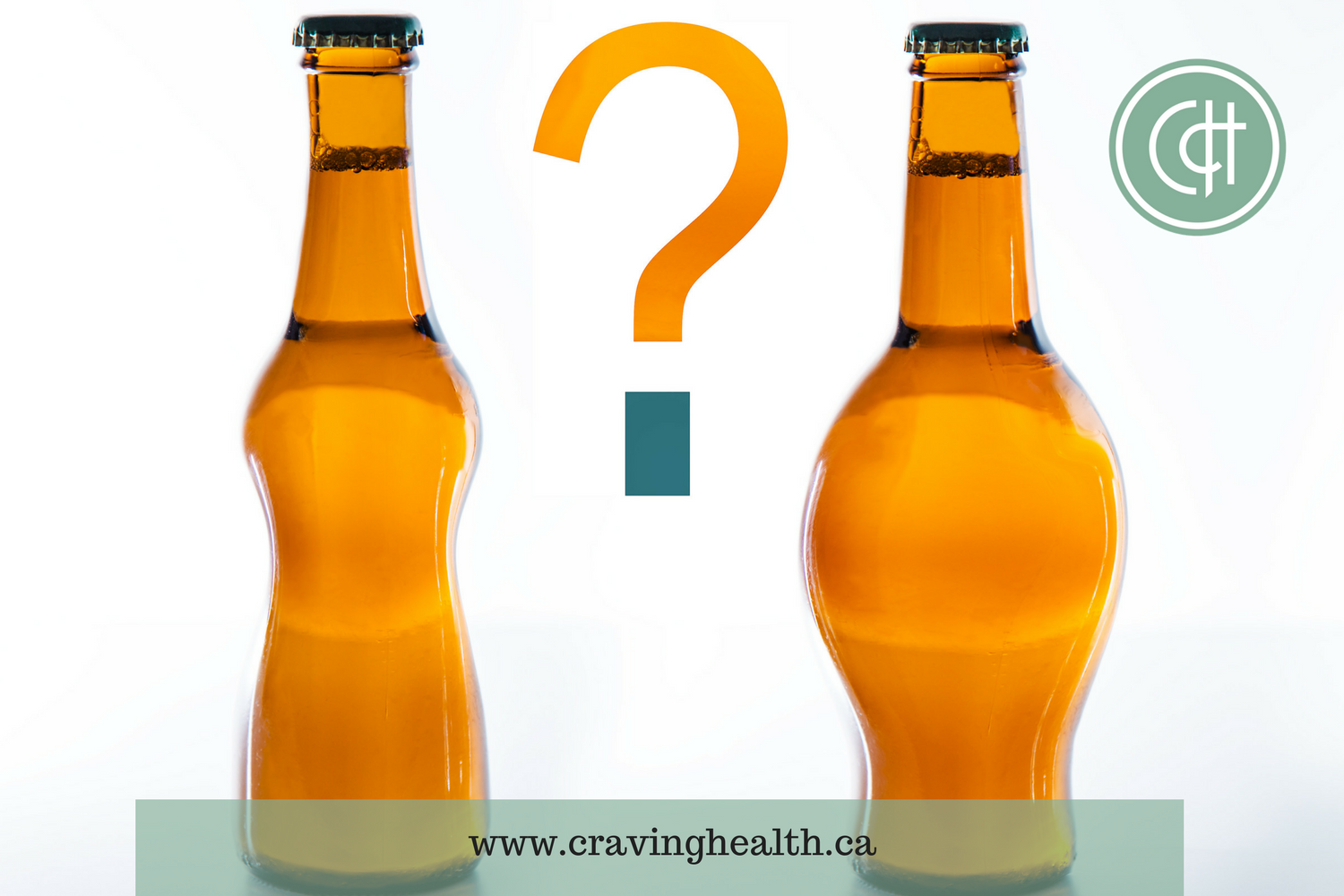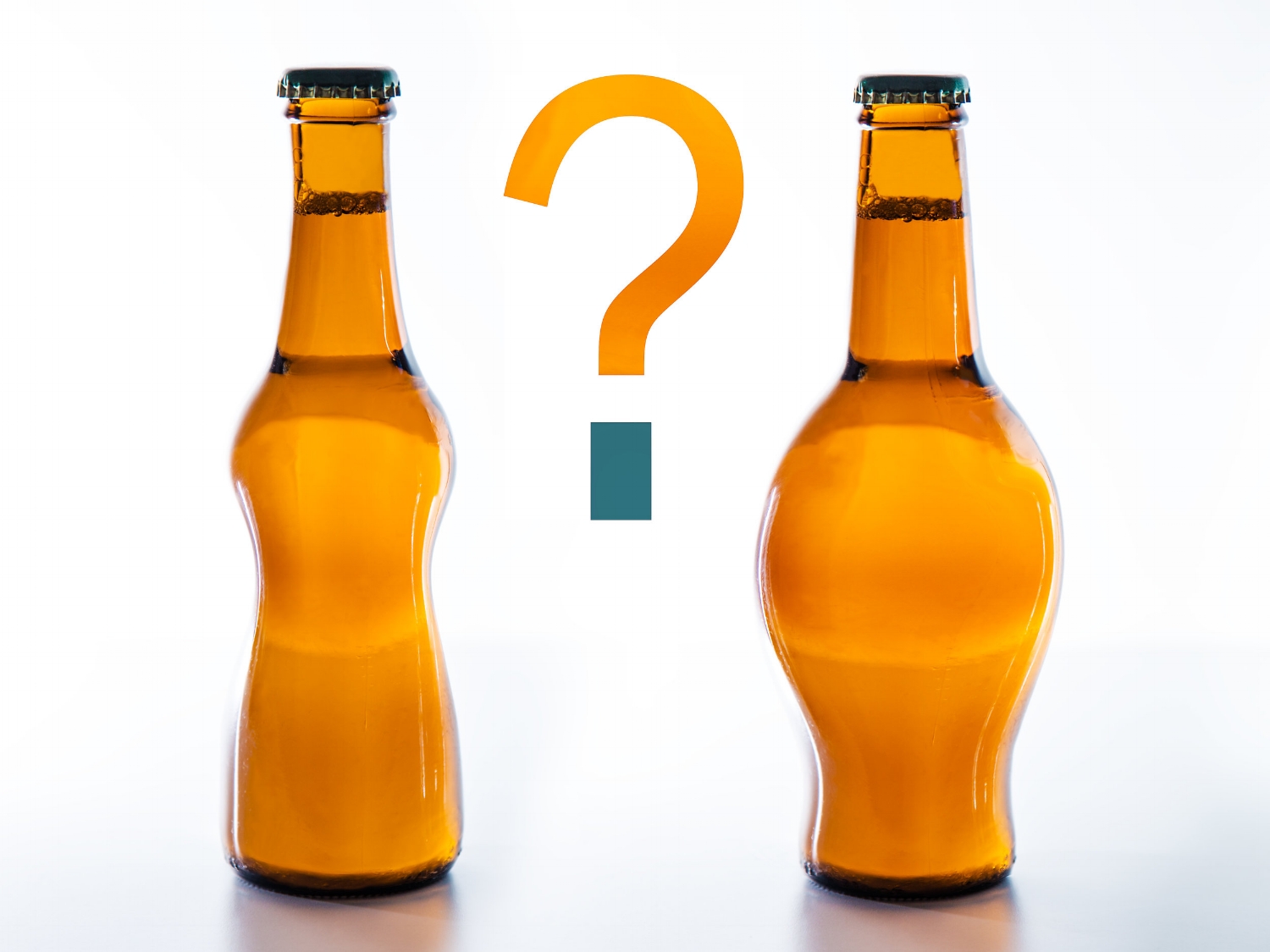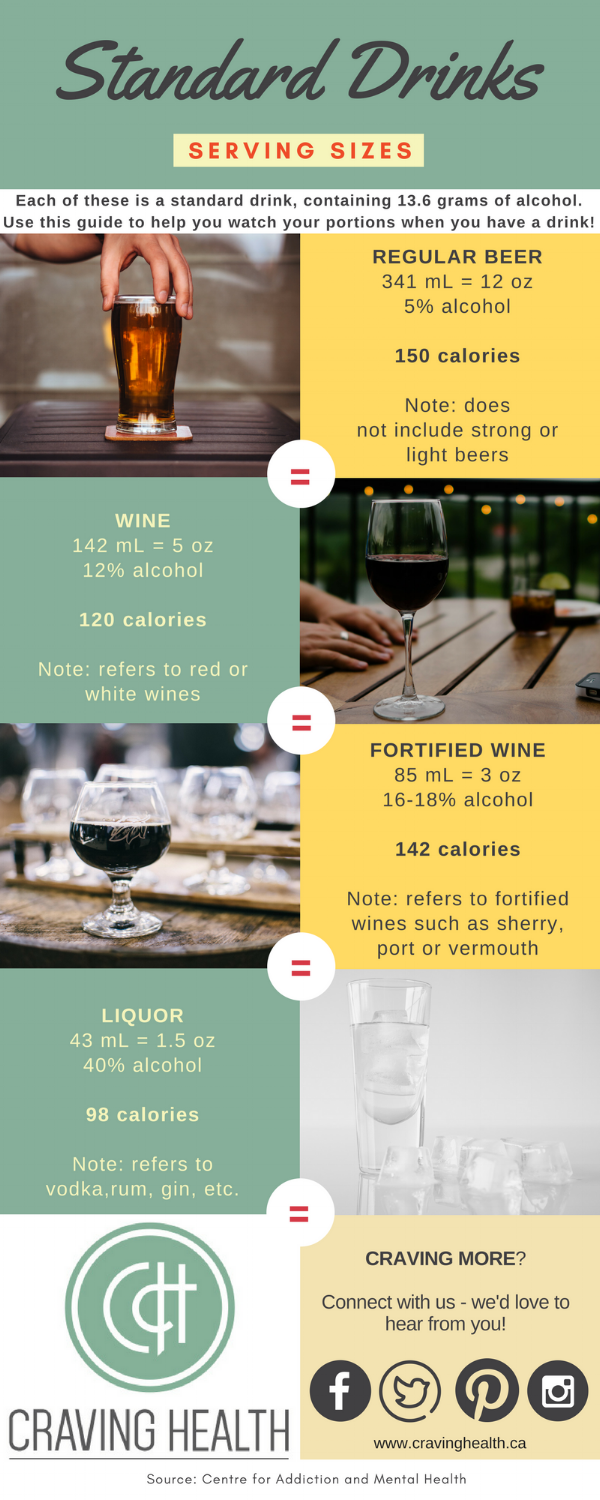It’s patio; BBQ; wedding; social and happy-hour season at any given time of the year, my friends! Sipping on a cool alcoholic beverage sounds like such an appealing way to unwind with friends after a long week. But, is this pleasurable activity sabotaging your weight loss goals?
The short answer: it depends! Clients often ask me, “Does drinking alcohol affect my weight? Can I drink and still lose weight?” I tell them that it can definitely be part of a healthy lifestyle, so long as you’re still incorporating other healthy habits and enjoying it wisely.
What does that mean? Well, I have a few tips for you to consider if you choose to enjoy a few ‘cold ones’ on occasion, while still keeping on track with your weight loss journey.
Fact 1: Alcohol = Epitome of Empty Calories
Alcohol contains 'empty calories,’ meaning that alcohol replaces nutrient dense foods in the diet and provides no nutritional benefit. Each gram of alcohol contains 7 calories (compare that to 4 calories per gram for carbs and protein and 9 calories per gram for fat).
So, it only makes sense that alcohol does indeed have the potential to promote packing on the pounds. You've also likely heard the term “beer belly.” This happens because alcohol promotes fat storage in our abdominal area and may be seen more often in men1.
Furthermore, because alcohol is actually a toxin (and the body wants to rid itself of it as quickly as possible), when we drink alcohol and consume fat, the body stores fat and uses up the alcohol as an energy source1.
You may be wondering: “How many calories exactly can be found in my favourite drink?”
Well for starters, it’s important to be aware of what is considered a ‘standard drink.’ As you will see from the foregoing infographic, the following items are all considered to be one standard drink serving. While the volume and calories of each vary, the actual amount of alcohol (in the form of pure ethanol is identical).
Fix 1: Follow the Low-Risk Drinking Guidelines
For the health of your liver (and waistline), follow the low risk drinking guidelines. According to the Centre for Mental Health & Addiction (CMHA)2, for women, this is no more than 2 standard drinks per day (maximum 10 per week). And for men, no more than 3 standard drinks per day (maximum 15 per week).
You may be thinking, “Can I save up all my drinks to have over one or two nights?” No, sorry. The CMHA classifies that as binge drinking. Not to mention, it’s a surefire recipe for a hangover that nothing can cure but time.
Lastly, aim to always have some non-drinking days each week to reduce the likelihood of forming a not-so-good daily drinking habit and preventing your body from building up a tolerance to alcohol (i.e.: needing to drink more and more to have the same effect).
Fact 2: Alcohol Add-ins, Add up!
Like specialty coffees, it’s not necessarily the coffee that’s the problem, it’s all the stuff added to it that creeps up on you! Similarly, alcohol can be enjoyed in moderation, but you’ll want to avoid the specialty sugar-laden drinks. I’m talking about you, Daiquiris and Margueritas… While an evening in Marguerita-ville sounds like a ton of fun, it might be a one-way ticket to overindulgence… And you might not even know it!
Did you know that one Milestones Bellini has almost 400 calories and a whopping 23 grams of sugar3? Since every 4 grams of sugar equals one teaspoon, that’s like 6 teaspoons of sugar in your glass. Not looking so tempting anymore, is it?
As a passionate advocate of moderation, this dietitian says, “it’s totally okay to say bottoms-up to the Bellini once in a while,” (but for the sake of your waistline, limit it to just one and pass on other high sugar foods and drinks that day).
Fix 2: Cut your Calories, Save the Taste!
Opt for these drink ideas to cut the calories, while still enjoying your favourite bevvy:
1.5 oz Vodka/gin + 3 oz sparkling water + fresh lime
Wine Spritzer – 3 oz wine + 3 oz sparkling water (or ice) (I know, faux paux to many wine connoisseurs but if it works for you, go with it!) Bonus: you’ll also be staying a bit more hydrated!
Try something new and refreshing by mixing Kombucha (a fermented tea that contains good-for-your-gut probiotics) + spirit of your choice. Most store-bought Kombucha contains 30 calories per cup (60 calories per bottle) and little, to no, added sugar.
Try mixing half sugar-free ginger ale and half beer.
If ordering wine when dining out, order it by the glass not by the bottle.
Did you know? A 5 oz glass of wine has 120 calories… Drink the whole bottle and you're adding 625 calories to your meal.
Go "faux" by mixing sparkling water with a splash of 100% juice of your choice and drink it in a fancy glass to get the effect, but less calories and no alcohol!
Better yet, try having a girl’s night in, and make these tantalizing but lower calorie drinks here!
Did you know? A 5 oz glass of wine has 120 calories… Drink the whole bottle and you're adding 625 calories to your meal.
Fact 3: Alcohol Amplifies your Appetite!
Along the same lines of moderation, it’s just as important to be mindful of what you eat, while you are drinking. It’s so easy to overindulge in food while we drink. In fact, drinking can turn on hormones that increase our appetite, according to the Journal of Health Psychology and the Journal of Endocrine Research4,5. Restaurants capitalize on this by usually offering you a drink before you eat because they know that alcohol will increase your appetite and therefore, increase their paycheck.
Fix 3: Curtail your Cravings!
Instead of ordering fried, high-calorie foods, try ordering things like:
Chicken sandwich on whole grain bread with a side of roasted/steamed veggies
Garden salad with chicken, fish, or tofu and dressing on the side
Share a meal with a friend!
Another good idea is to eat something before you go out. Include a protein and high fibre snack to keep you feeling satisfied. Any of our snacks will do the trick!
Fact 4: Hangry Hangover Effect!
Let me be the first to confess that hangovers are NOT FUN. Yes, I am a dietitian but I will not deny that I have had my share of nights overdoing it in the drinking department only to experience regret the next day from what I like to term the, “Hangry Hangover Effect” (HHE for short).
When experiencing the HHE, a number of symptoms will befriend you including a headache, irritability, feeling downright crummy, and HUNGRY for high fat, high calorie foods. There is science to back-up why we feel hungry when hungover. Drinking causes a temporary drop in our blood sugar levels as well as suppresses the hormones that help control our appetite6. When we drink on an empty stomach, the effects are worsened the next day. Hence, the reason why a fast food combo becomes so alluring the day after drinking way more than you should have.
Fix 4: Opt for Occasional Drinking!
While there is no “magic hangover cure,” there are some steps you can take to proactively prevent the wicked HHE.
Step #1: Eat a well-balanced meal before drinking. Why? Alcohol is absorbed directly across the wall of the stomach and it can reach the brain in less than one minute! You can feel the effect much more quickly on an empty stomach1. So, having a balanced meal will slow the absorption of alcohol.
Step #2: Space your drinks at least one hour apart. Why is this important, you may be asking? The liver processes ½ oz of pure ethanol (that's equal to 1 standard drink) per hour. That means the more you drink, the longer it takes to get out of your system. To satisfy thirst in between drinks (if you're having more than one drink), try a squeeze of fresh lemon or lime with water1. It's a myth that drinking caffeine will help to sober-up an intoxicated individual. It simply acts as a stimulant in the body making one feel more alert1.
Step #3: As noted above in Fix #1, if you’re looking to manage your weight and live a healthy lifestyle, keep within the safe drinking limits. The key is to make it work for you and your social life.
Fact 5: Booze ruins your Snooze!
Although alcohol may help some people to fall asleep more quickly, research shows that drinking alcohol too close to bed time can affect your sleep cycle and the quality of your sleep, according to a publication from the National Institute on Alcohol Abuse and Alcoholism7.
Poor sleep disrupts the hormones that control our appetite, which in turn may contribute to weight gain. In addition to poor sleep, drinking reduces our inhibitions for hunger, so we tend to snack on higher calorie foods4,8. All of these factors may contribute to weight gain.
If one feels like they must have a drink, then I would recommend enjoying a drink earlier in the evening with a balanced meal and backed by plenty of water (but maybe not too much because waking up in the middle of the night to go to the bathroom is never fun either… Lol)!
Looking to learn more? In a previous post, I discussed why good quality sleep is beneficial for your waist line. Click here to read that post and learn some sleep hygiene tips that are sure to help you feel more rested.
Fix 5: Defend your last Hour!
To sum things up, here are the steps you want to take to prevent booze from ruining your snooze:
Have your last drink a few hours before bed
Drink a zero-calorie beverage such as water or decaffeinated tea before bed
Eat a balanced, protein packed breakfast the next day with LOTS of water. The protein (e.g. eggs, nuts, cheese, Greek yogurt) will help balance your blood sugar. Staying hydrated is important to replenish fluids and to reduce the tendency to reach for food when thirst is the culprit.
WHAT'S THE BOTTOM LINE?
Just like the 80/20 rule (eating mostly healthy, most of the time and allowing for the occasional treat and/or drink, in mindful moderation), I recommend that you plan out your meals and snacks, knowing that you’re going to consume more in the way of liquid calories that day.
Eat well-balanced meals (1/2 plate veggies, ¼ plate complex carbs/ ¼ plate good quality protein) and snacks throughout the day. Also, ditch the empty-calorie, nutrient-poor foods such as: fried foods, sweets and refined carbohydrates.
Need some balanced meal and snack ideas? We’ve got you covered! Browse our recipes here and here.
You may also want to increase your physical activity a bit more when you consume alcohol to help balance out the extra calories you’ve consumed.
Remember, life is meant to be lived; especially when the sun is out! Enjoy a drink with friends and family (and truly enjoy it!). In other words, be in the moment with your drink -you’re likely to drink less when you’re more mindful of it.
As Julia Child once said, “I enjoy cooking with wine, sometimes I even put it in the food!”9
Cheers to happy drinking and continued healthy living!
Want more to learn more food facts and tips on how to enjoy your life while still being healthy? Join our Facebook Group – the Craving Healthy Habits Community! Besides being a place to share and reflect, we also host contests and challenges to keep you motivated while having fun.
References:
1 - Sizer, FS., Whitney, EN, & Piche, LA. (2015). Nutrition Concepts & Controversies. Third Canadian Edition. Nelson Education, Toronto ON.
2 - Centre for Addiction and Mental Health. Accessed https://www.camh.ca/-/media/files/canadas-low-risk-guidelines-pdf.pdf on July 12, 2017.
3 - MyFitnessPal. Accessed http://www.myfitnesspal.com/food/calories/milestones-original-bellini-2796548 on June 19, 2017.
4 - Christiansen P, Rose A, Randall-Smith L & Hardman CA. Alcohol's acute effect on food intake is mediated by inhibitory control impairments. Health Psychol. May;35(5):518-22. doi: 10.1037/hea0000320. Epub 2015 Dec 21.
5 - Calissendorff J, Gustafsson T, Holst JJ, et al. Alcohol intake and its effect on some appetite-regulating hormones in man: influence of gastroprotection with sucralfate. Endocr Res. 2012;37(3):154-62. doi: 10.3109/07435800.2012.662662. Epub 2012 May 23.
6 - Cains S, Blomeley C, Kollo M, et al. Agrp neuron activity is required for alcohol-induced overeating. Nature Communications. Published online January 10 2017.
7 - Sleep, Sleepiness and Alcohol Use. National Institute on Alcohol Abuse and Alcoholism. Accessed https://pubs.niaaa.nih.gov/publications/arh25-2/101-109.htm on July 13, 2017.
8 - Caton, S. J., Nolan, L. J. & Hetherington, M. M. Alcohol, appetite and loss of restraint. Curr. Obes. Rep. 4, 99–105 (2015).
9 - Matchbook Mag Top 20 Julia Child Quotes. Accessed https://www.matchbookmag.com/daily/47-top-20-julia-child-quotes on June 23, 2017.







Jodi Robinson, dietitian & founder of Craving Health, is a healthy eating coach who helps busy people clear their confusion about healthy eating and discover simple and sustainable meal and snack solutions. She is most passionate about helping her clients realize healthy eating really isn't complicated and can taste great!